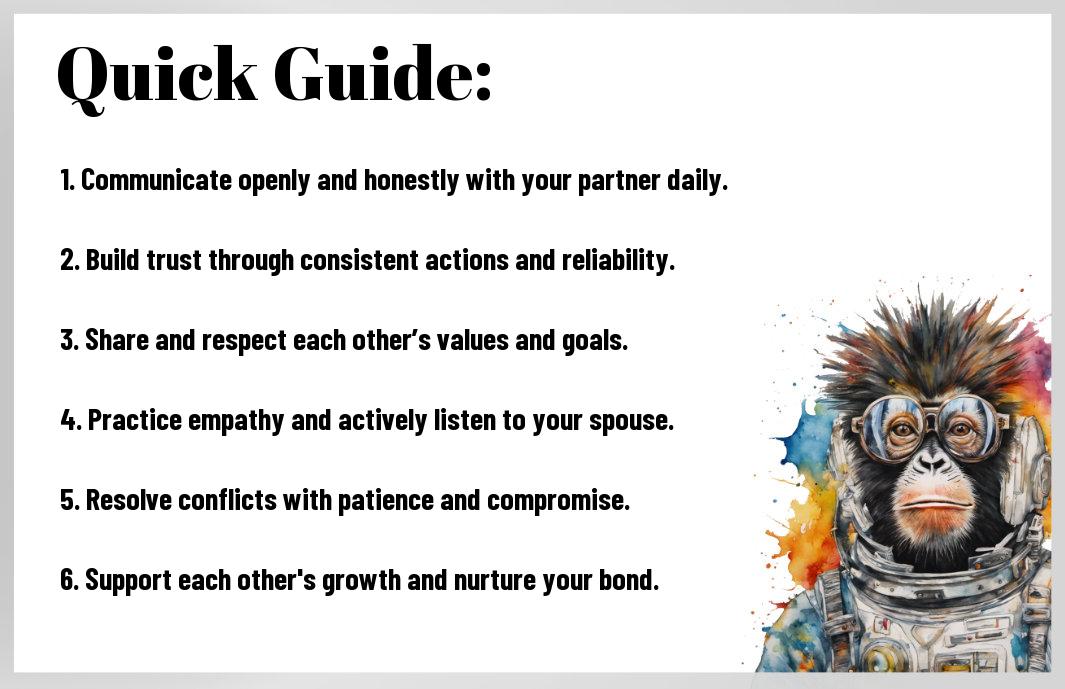Over the course of your life, understanding the fundamentals of marriage can enrich your relationships and prepare you for a fulfilling partnership. This guide will equip you with crucial insights into effective communication, trust-building, and conflict resolution that are vital for a healthy marriage. By exploring these foundational aspects, you’ll empower yourself to create a strong bond with your partner, navigate challenges with confidence, and ultimately cultivate a loving and supportive environment that thrives on mutual respect and understanding.
Key Takeaways:
- Effective communication is imperative for building and maintaining a healthy marriage, allowing partners to express their needs and resolve conflicts amicably.
- Mutual respect and understanding of each other’s differences contribute to a stronger bond, fostering an environment where both partners feel valued and accepted.
- Continuous effort in nurturing the relationship, including regular check-ins and shared experiences, can enhance intimacy and connection between partners.
The Evolution of Marriage: Historical Perspectives
The concept of marriage has transformed significantly through centuries, influenced by cultural, economic, and societal shifts. Initially serving more as a transactional arrangement, marriage has progressed to encompass emotional and personal dimensions, bypassing rigid traditions that once dictated human connections. By examining historical contexts, you can appreciate how modern marriage has emerged as a partnership grounded in love, mutual respect, and shared goals.
Ancient Traditions and Their Influence
In ancient civilizations, marriage often functioned as a strategic alliance between families, prioritizing economic stability and social status over individual desire. From Rome to China, unions were designed to fortify kinships, ensure property rights, and improve lineage. These early traditions laid the groundwork for many cultural norms still seen today, despite your modern interpretations of love and partnership.
The Shift to Modern-Day Concepts of Partnership
The transition from arranged marriages to partnerships based on affection gained momentum during the Enlightenment, fundamentally reshaping societal views on love and commitment. As industrialization took hold, marriages began to reflect personal choices rather than familial expectations. The rise of individualism and changing gender roles further emphasized the need for egalitarian relationships. These shifts culminated in the modern perception of marriage as a partnership, where emotional support, shared responsibilities, and mutual growth take precedence. Today, as you navigate your own relationships, understanding these historical perspectives can help you appreciate the evolving nature of marital bonds.

The Essential Components of a Successful Marriage
Every successful marriage thrives on key components that foster growth and connection between partners. Emotional intimacy, mutual respect, and shared goals create a strong bond. However, effective communication, trust, and constructive conflict resolution stand out as the bedrock elements that can either solidify or undermine your relationship. Focusing on these components allows couples to navigate the complexities of partnership more effectively, creating a fulfilling life together.
Communication: The Cornerstone of Connection
Open and honest communication forms the bedrock of any strong marriage. It allows you to express your thoughts, feelings, and needs in a way that your partner can understand. Effectively communicating fosters intimacy and deepens emotional connections, ultimately nurturing a healthier relationship.
Trust and Honesty: Building a Strong Foundation
Trust and honesty weave a strong foundation for your marriage, allowing vulnerability and openness. Without these elements, insecurities and misunderstandings can arise, leading to a breakdown in your relationship. You should actively cultivate trust through transparency in your actions and intentions.
Building trust involves consistently demonstrating reliability and being accountable to one another. This foundational aspect of your marriage requires ongoing effort; engage in open discussions about expectations and feelings. Creating a safe space for sharing concerns reinforces your bond and fosters a deeper understanding of one another, allowing your relationship to flourish in an environment of mutual respect.
Conflict Resolution: Navigating Differences Effectively
A healthy marriage isn’t devoid of conflict; rather, it’s about how you manage disagreements when they arise. Effective conflict resolution strategies help you navigate differences without letting them escalate into destructive confrontations. Phrasing your concerns constructively can lead to productive conversations and conflict resolution.
Effective conflict resolution hinges on active listening and a willingness to empathize with your partner’s perspective. Employ techniques such as “I” statements to express feelings without assigning blame, ensuring that both partners feel heard and acknowledged. Collaboratively seeking solutions can strengthen your connection and foster a sense of teamwork within the marriage, transforming potential strife into opportunities for growth.

The Psychological Landscape of Relationships
Your relationship’s psychological landscape is shaped by a multitude of factors, including individual backgrounds, experiences, and emotional dynamics. Understanding how these elements interact can illuminate patterns that either strengthen or weaken your bond. Recognizing these psychological underpinnings enables you to address challenges more effectively and enhances your overall emotional connection. Couples often grapple with unspoken issues that linger beneath the surface; by navigating this complex terrain together, you can forge deeper connections and foster a more resilient partnership.
Attachment Styles and Their Impact on Marital Dynamics
Your attachment style profoundly influences how you connect with your partner. Whether you lean towards secure, anxious, avoidant, or disorganized attachment, these patterns dictate your interactions and emotional responses within the marriage. Identifying your own and each other’s attachment styles can lead to healthier communication strategies, allowing you both to address conflicts with greater understanding and empathy.
Emotional Intelligence: The Key to Understanding Your Partner
Developing emotional intelligence is necessary for navigating the complexities of your partner’s feelings and behaviors. Understanding emotional cues fosters empathy and allows for better conflict resolution. As you enhance your emotional intelligence, your ability to interpret your partner’s needs increases, which lays the groundwork for a more supportive and nurturing relationship.
Focusing on emotional intelligence involves recognizing your feelings and those of your partner during various interactions. For example, when you sense tension brewing, responding with openness rather than defensiveness can transform the moment. Engaging in active listening, reflecting back what you hear, and validating emotions can dispel misunderstandings and foster a deeper connection. By consistently cultivating these skills, you can create an environment where both partners feel understood and valued, paving the way for lasting harmony in your marriage. Studies show that couples who practice emotional intelligence report higher relationship satisfaction, demonstrating its powerful impact on marital dynamics.
Practical Strategies for Cultivating a Lasting Union
Building a lasting union requires intentional effort, but several practical strategies can help you foster a deeper connection with your partner. Start by implementing regular communication practices, setting shared goals, and engaging in activities that strengthen your bond. Small acts of kindness, such as leaving notes or surprises, can reignite the flame. Ultimately, a focus on mutual respect, understanding, and collaboration creates the foundation for a resilient partnership.
Date Nights and Quality Time: Keeping the Spark Alive
Allocating dedicated time for date nights is necessary for nurturing intimacy and connection. These moments allow you to step away from everyday responsibilities and invest in your relationship. Try exploring new activities together, sharing experiences, or revisiting cherished places to reignite the excitement and create lasting memories.
Financial Planning: Aligning Goals and Values
Aligning your financial goals and values forms the backbone of a healthy relationship. By openly discussing your financial priorities, you can minimize misunderstandings and foster a sense of teamwork. Establishing a shared budget or savings plan can guide your spending decisions while ensuring both partners feel valued and heard.
Effective financial planning sets the stage for a solid partnership, as shared financial goals encourage open communication and collaboration. For instance, consider creating a joint savings fund for significant milestones like a home purchase or vacation. Tools like budgeting apps can help you track expenses and ensure accountability. Understanding each other’s spending habits creates transparency and builds trust, which can alleviate stress surrounding finances. Regular check-ins about your financial situation or any changes in your respective incomes or priorities also help maintain alignment, enriching the emotional connection and stability in your marriage.
The Societal Influences on Modern Marriages
Modern marriages are significantly shaped by the broader societal context in which they exist. Issues like evolving gender roles, economic pressures, and shifting social norms all play transformative roles in how partnerships are formed and maintained. Understanding these influences can help you navigate the complexities of modern marital relationships, allowing for healthier dynamics that respond to both personal needs and societal expectations.
Media Representation and Its Effects on Expectations
Media representation shapes your perceptions and expectations of marriage in profound ways. Idealized portrayals of romance and conflict resolution in films and television influence how you perceive relationship dynamics. For example, when you repeatedly see perfect couples facing minimal challenges, it can lead to unrealistic standards, causing dissatisfaction when real-life marital struggles arise.
Cultural Norms and Their Role in Shaping Marriage
Cultural norms dictate acceptable behaviors and expectations surrounding marriage, guiding your understanding of what it means to be a partner. These norms can include everything from gender roles to expectations about parenting and financial responsibilities. Societal trends, such as the increasing acceptance of same-sex marriage or cohabitation, also reflect changing cultural perspectives that influence how you view and engage in relationships.
For instance, in many cultures, traditional gender roles dictate that husbands are the breadwinners while wives are caregivers. However, as societies evolve, these expectations shift to accommodate dual-income households and equitable parenting. You may find that the pressure to conform to these historical norms can create tension in your marriage if your personal beliefs diverge from cultural expectations. The rise of egalitarian partnerships showcases how many couples are now choosing to redefine those roles, leading to greater satisfaction and partnership equity. Understanding these cultural influences enables you to create a marriage that feels authentic to you, rather than merely conforming to outdated constructs.
To wrap up
Following this exploration of the fundamentals of marriage, you should feel more equipped to understand the core elements that form a successful partnership. By recognizing the importance of communication, trust, and mutual respect, you can foster a healthier relationship. As you continue on your journey, prioritize these foundational aspects to strengthen your bond and enhance your marital satisfaction. Embrace the learning process, and don’t hesitate to seek support when needed, as every relationship can benefit from guidance and growth.
FAQ
Q: What are the key elements that contribute to a successful marriage?
A: A successful marriage often hinges on several key elements, including effective communication, mutual respect, trust, and shared values. Effective communication helps partners express their needs and feelings openly, fostering understanding. Mutual respect ensures both individuals value each other’s opinions and contributions, creating a balanced partnership. Trust serves as the foundation for emotional security within the relationship, allowing both partners to feel safe and supported. Lastly, aligning on core values and life goals can help couples navigate challenges together and build a life that reflects both partners’ aspirations.
Q: How does conflict resolution impact a marriage?
A: Conflict resolution is integral to maintaining harmony in a marriage. Disagreements are natural in any relationship, but it is how couples handle these conflicts that can either strengthen or weaken their bond. Engaging in constructive dialogue, where both partners listen actively and work together to find solutions, can lead to deeper understanding and intimacy. On the other hand, avoidance or unhealthy communication can escalate tensions and create distance. Therefore, learning conflict resolution techniques, such as compromising or seeking professional guidance, can significantly enhance the overall health of the marriage.
Q: What role does intimacy play in a marital relationship?
A: Intimacy is a fundamental aspect of marriage that encompasses emotional, physical, and intellectual connections between partners. Emotional intimacy fosters a deep sense of trust and vulnerability, allowing partners to share their innermost thoughts and feelings without fear of judgment. Physical intimacy, including affection and sexual connection, strengthens the bond and creates a sense of closeness. Lastly, intellectual intimacy promotes shared interests and stimulating conversations, which can enhance the relationship. Together, these forms of intimacy contribute to a fulfilling marriage, helping couples feel connected and engaged with one another.


Leave a Reply